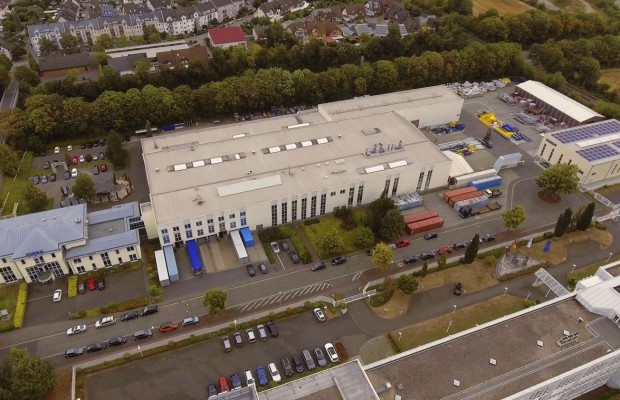Environmental protection and sustainability
Masa successfully implements measuresAndernach/Porta Westfalica 23 мар. 2022 г. - Social responsibility, economic performance and environmental protection are inseparable in the sense of the basic idea of sustainable production. Masa had the energy consumption and consumers at the Andernach and Porta Westfalica sites systematically recorded, analyzed and evaluated. Masa then implemented the catalog of measures derived from this.
The manufacture of economical machines and production plants with long life cycles and a long service life is a living reality for us. This very effective form of sustainability, the long-term use of goods in conjunction with high manufacturing quality, has always determined the global mission statement of the mechanical engineering company. The permanent further development of plant concepts and the use of modern drive and control technology enable our customers to manufacture their products in a resource-conserving and energy-efficient way. However, the company also focuses on sustainability in the preceding, in-house production of Masa machines and the associated activities.
One of the cornerstones for Masa is a large domestic value-added share, which is achieved at the two German production sites in Andernach and Porta Westfalica with products of consistently high quality and in compliance with demanding occupational safety standards.
We also see a great opportunity to go beyond the guidelines for achieving the European energy and climate protection targets, to implement sustainable processes in the company and to continuously subject our own products to further energy optimization. Energy audits are used to systematically and transparently record, analyze and evaluate energy consumption and energy consumers. With the subsequent identification and implementation of various economic energy efficiency measures, we strengthen our energy productivity and thus our own competitiveness. In addition, Masa sensitizes its employees with regard to energy efficiency.
Building and energy concept
- Both in Andernach and in Porta Westfalica, wall and roof areas were subjected to extensive energy refurbishment measures. The photovoltaic system installed on the building of the spare parts hall in Andernach with two solar inverters and a connected load of 25-27 kWp each has been in operation since 2017 and covers the hall's entire electricity requirements. The potential in Porta Westfalica for a further photovoltaic system has already been recorded in this context, as have further renovation options for roof surfaces and windows.
- The production halls at both sites were equipped with a daylight and time control system, and the company also gradually converted the lighting in both the office buildings and the production areas to LED technology. Motion detectors in corridors and stairwells also help to save energy. The modernization of boilers and the control of the heating system was also tackled.
- Interestingly, the company's own paint shop offered an opportunity for heat recovery: the extraction system at the Porta Westfalica site was renewed so that up to 65% of the heat from the extracted air can be recovered through the use of a rotary heat exchanger. This saves annual heating costs of over €10,000 and correspondingly also CO2. Plans are also already underway for Andernach.
More environmentally friendly mobility
- The update of the cross-site company car policy cleared the way for the switch to low-emission e-mobility. 6 charging stations with a total of 12 charging points were put into operation in Andernach in 2021 to supply the company vehicles with electricity. If required, the charging stations can also be used by the workforce. The charging stations in Porta Westfalica will also be installed shortly.
- We also support our own employees in switching to bicycles: Since 2021, the company has been participating in the company bike leasing model, thus promoting the investment of employees in an environmentally friendly and health-promoting means of transportation.
- Energy recovery also plays a role in mobility at the plant: When purchasing new forklift trucks, preference is given to models that use regenerative braking to return up to 30 percent of the energy to the battery.
Waste reduction/circulation/recycling
- Both the reduction and avoidance as well as the management of waste generated came into focus at Masa. Separate waste collection and disposal is constantly being expanded and optimized, beverage vending machines are being converted to use thermal reusable cups, and disposable pallets are being replaced with reusable pallets. The paper presses installed at both sites compress the waste paper produced, so that the number of trips to disposal companies has been significantly reduced.
- As an alternative to solvent-based lacquers with a high VOC content, water-based lacquers are used in production in Andernach. In Porta Westfalica, conversion to electrostatic lacquering was carried out. This significantly reduced both lacquer consumption and the amount of lacquer waste.
- A pilot project initiated in the electrical sector is pursuing the goal of replacing paper drawings and bills of materials as far as possible by means of increased digitization.
- In administration, too, the increasing digitization of processes and the predominantly digital exchange of invoices with customers and suppliers have led to a significant reduction in paper consumption.
CONCLUSIONS:
The aforementioned measures exemplify our efforts to make the production of machinery more resource-conserving and energy-efficient. In the future, too, we will not lose sight of the goal of "CO2-neutral production" when modernizing and acquiring new equipment, as evidenced, for example, by the current modernization of the compressor system, which has resulted in energy savings of around 30%.

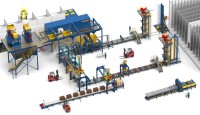 От перемешивания сырья до выдачи готового изделия осуществляется ряд технологических операций, в которых участвуют многие компоненты установки. Четкое взаимодействие компонентов установки и оптимизация производственных процессов становятся залогом экономически эффективного производства.
От перемешивания сырья до выдачи готового изделия осуществляется ряд технологических операций, в которых участвуют многие компоненты установки. Четкое взаимодействие компонентов установки и оптимизация производственных процессов становятся залогом экономически эффективного производства.
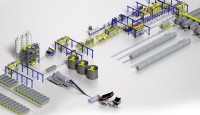 В производстве газобетона высокие требования предъявляются к предварительной подготовке и дозированию сырьевых материалов, контролю процесса ферментации, а также к автоматическому управлению всеми производственными процессами. Газобетонные установки фирмы «Маза» технологически совершенны и проектируются согласно индивидуальным требованиям Клиентов. Концепции наших заводов гарантируют высокую экономическую рентабельность, оптимальный ход технологических процессов и неизменно высокое качество готовых изделий.
В производстве газобетона высокие требования предъявляются к предварительной подготовке и дозированию сырьевых материалов, контролю процесса ферментации, а также к автоматическому управлению всеми производственными процессами. Газобетонные установки фирмы «Маза» технологически совершенны и проектируются согласно индивидуальным требованиям Клиентов. Концепции наших заводов гарантируют высокую экономическую рентабельность, оптимальный ход технологических процессов и неизменно высокое качество готовых изделий.
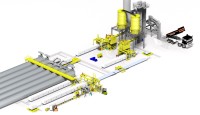 Это долгий путь, который сырьевые материалы проходят от приготовления смеси до выпуска готовых изделий. Здесь задействовано множество технологических компонентов. Только если отдельные части установки согласованы между собой, можно обеспечить бесперебойность всего процесса и эффективную эксплуатацию силикатного завода.
Это долгий путь, который сырьевые материалы проходят от приготовления смеси до выпуска готовых изделий. Здесь задействовано множество технологических компонентов. Только если отдельные части установки согласованы между собой, можно обеспечить бесперебойность всего процесса и эффективную эксплуатацию силикатного завода.
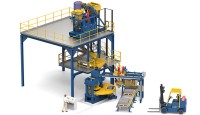 От смешивания сырьевых материалов до выдачи готового изделия (бордюрного камня) осуществляется ряд технологических операций. Бордюрные прессы фирмы "Маза" были расзаботаны с учетом требований "британского стандарта", применяемого к бордюрному камню. "Британский стандарт" действителен в Великобритании и странах Ближнего Востока и по сей день.
От смешивания сырьевых материалов до выдачи готового изделия (бордюрного камня) осуществляется ряд технологических операций. Бордюрные прессы фирмы "Маза" были расзаботаны с учетом требований "британского стандарта", применяемого к бордюрному камню. "Британский стандарт" действителен в Великобритании и странах Ближнего Востока и по сей день.
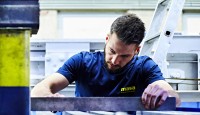 Установки и оборудование фирмы "Маза" монтируются в вводятся в эксплуатацию силами опытных специалистов компании. При этом фирма "Маза" делает ставку на квалифицированный персонал, обученный в Германии.
Установки и оборудование фирмы "Маза" монтируются в вводятся в эксплуатацию силами опытных специалистов компании. При этом фирма "Маза" делает ставку на квалифицированный персонал, обученный в Германии.
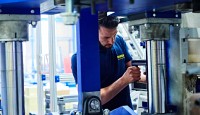 Сервисное обслуживание фирмы "Маза" выходит далеко за границы монтажа и ввода в эксплуатацию установки и опирается на специальное ноу-хау и более чем 110-летний опыт в отрасли.
Сервисное обслуживание фирмы "Маза" выходит далеко за границы монтажа и ввода в эксплуатацию установки и опирается на специальное ноу-хау и более чем 110-летний опыт в отрасли.
 У Вас возникла необходимость в технической поддержке при эксплуатации Вашей установки? Отдел техподдержки фирмы "Маза" нацелен на качество и доступность предлагаемых услуг. В рамках технической поддержки оказывается "скорая помощь" при возникновении технических проблем, загружается обновление программного обеспечения, производится расширение функций производственной линии или решаются технические вопросы различной степени сложности.
У Вас возникла необходимость в технической поддержке при эксплуатации Вашей установки? Отдел техподдержки фирмы "Маза" нацелен на качество и доступность предлагаемых услуг. В рамках технической поддержки оказывается "скорая помощь" при возникновении технических проблем, загружается обновление программного обеспечения, производится расширение функций производственной линии или решаются технические вопросы различной степени сложности.
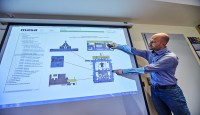 Одной из предпосылок увеличения прозводительности и качества оборудования является постоянное повышение квалификации персонала, обслуживающего линию.
Одной из предпосылок увеличения прозводительности и качества оборудования является постоянное повышение квалификации персонала, обслуживающего линию.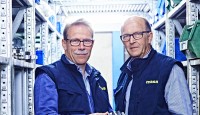 Вы ищете контактное лицо?
Вы ищете контактное лицо?
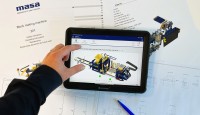 Облачный сервис Masa Service Cloud – это новейший продукт из семейства цифровых решений.
Облачный сервис Masa Service Cloud – это новейший продукт из семейства цифровых решений.
